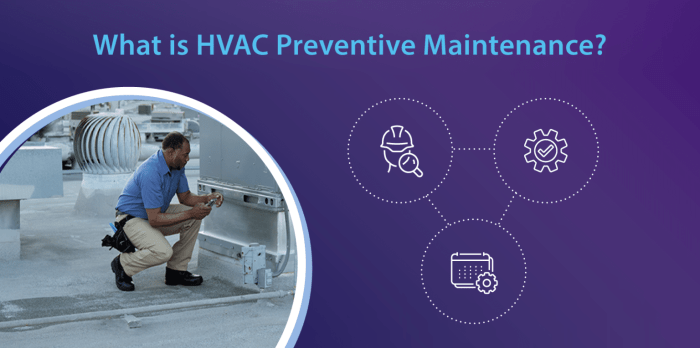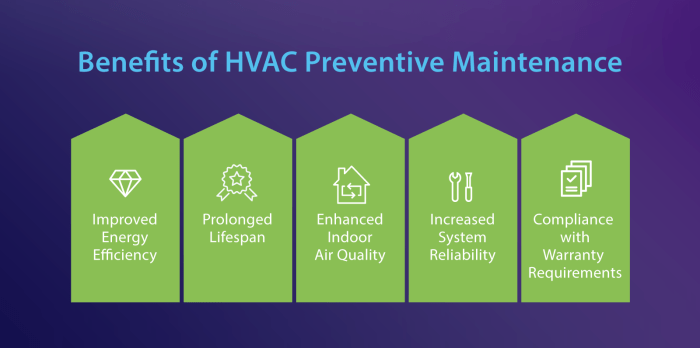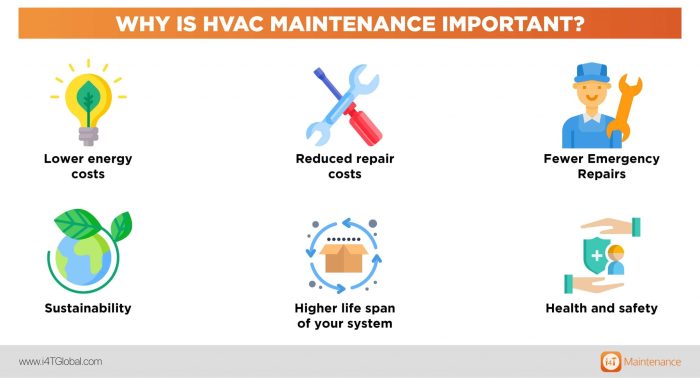Embark on a journey into the world of HVAC preventative maintenance, where we unravel the importance of regular upkeep for optimal system performance. From cost-saving benefits to enhancing indoor air quality, this guide covers it all.
Delve deeper into the components that require attention, the recommended frequency of maintenance, and the advantages of professional service for a longer-lasting HVAC system.
Importance of HVAC Preventative Maintenance
Regular HVAC preventative maintenance is essential for ensuring the efficiency and longevity of your system.
By scheduling routine maintenance, you can catch minor issues before they turn into major problems, potentially saving you from costly repairs down the line.
Preventing Costly Repairs
- Regular inspection and cleaning of HVAC components can help identify and address issues early on, preventing them from escalating into expensive repairs.
- Replacing worn-out parts during maintenance can extend the lifespan of your system and reduce the risk of sudden breakdowns.
- Proper maintenance can also contribute to improved system performance, reducing the likelihood of system failures that could result in significant repair costs.
Impact on Energy Bills and Indoor Air Quality
- Neglecting HVAC maintenance can lead to reduced energy efficiency, causing your system to work harder and consume more energy to maintain the desired temperature.
- Dirty filters and coils can obstruct airflow, making your system less efficient and increasing energy consumption.
- Poorly maintained HVAC systems can also result in decreased indoor air quality, as dust, mold, and other contaminants may circulate throughout your home or building.
Components of HVAC System Maintenance

Regular maintenance of key components in an HVAC system is essential to ensure optimal performance and energy efficiency. Neglecting maintenance can lead to system breakdowns, reduced lifespan of equipment, and higher energy bills.
Air Filters
One of the most crucial components of an HVAC system that requires regular maintenance is the air filter. Air filters help to trap dust, dirt, allergens, and other particles, preventing them from circulating throughout your home. Over time, these filters can become clogged, reducing airflow and forcing the system to work harder to maintain the desired temperature.
- Regularly cleaning or replacing air filters every 1-3 months is recommended to ensure proper airflow and indoor air quality.
- Clogged filters can lead to increased energy consumption, decreased system efficiency, and poor indoor air quality.
Ductwork
Another critical component of HVAC system maintenance is the ductwork, which distributes heated or cooled air throughout your home. Ducts can accumulate dust, debris, mold, and other contaminants over time, impacting the efficiency and air quality of the system.
- Inspecting and cleaning ductwork every 3-5 years can help improve airflow, reduce energy consumption, and enhance indoor air quality.
- Leaky or poorly insulated ducts can lead to air loss, inefficiency, and uneven heating or cooling in different areas of your home.
Frequency and Timing of HVAC Maintenance
Regular preventative maintenance is essential to keep HVAC systems running efficiently and prolong their lifespan. Here are some recommendations on how often HVAC systems should undergo maintenance and the best times of the year to schedule it.
Frequency of HVAC Maintenance
- It is recommended to schedule HVAC maintenance at least once a year. However, for optimal performance, it is advisable to have maintenance done twice a year, ideally in the spring before cooling season and in the fall before heating season.
- For commercial HVAC systems or in areas with extreme weather conditions, more frequent maintenance may be necessary to ensure consistent performance.
Timing of HVAC Maintenance
- Spring and fall are typically the best times of the year to schedule HVAC maintenance. This allows technicians to prepare the system for the upcoming cooling or heating season, respectively.
- During spring maintenance, technicians can clean the system after the winter months, check refrigerant levels, and make any necessary adjustments to ensure efficient cooling during the summer.
- For fall maintenance, technicians can clean the system after the summer months, check the heating components, change filters, and ensure the system is ready to provide warmth during the winter.
Impact of Seasonal Changes on Maintenance Schedule
- Seasonal changes can impact the maintenance schedule for HVAC systems as extreme temperatures can put a strain on the system. It is important to have maintenance done before the peak seasons to prevent breakdowns when the system is needed the most.
- Regular maintenance can help identify and address potential issues before they escalate, saving time and money on costly repairs.
Benefits of Professional HVAC Maintenance

When it comes to maintaining your HVAC system, hiring a professional technician can offer numerous advantages over attempting to do it yourself. Professional HVAC maintenance not only ensures the optimal performance of your system but also helps in extending its lifespan.
Comparison with DIY Maintenance
- Professional technicians have the necessary expertise and training to identify and address issues that may go unnoticed during DIY maintenance.
- DIY maintenance may lead to improper handling of components, which can result in costly repairs or even system breakdowns.
- Professionals use specialized tools and equipment to perform thorough inspections and maintenance tasks effectively.
Advantages of Hiring a Professional
- Professional technicians follow a systematic approach to maintenance, ensuring that all components are properly inspected and serviced.
- They can provide valuable insights and recommendations for improving the efficiency and performance of your HVAC system.
- Professionals have access to manufacturer-recommended parts and components, ensuring the quality and longevity of repairs.
Extending HVAC System Lifespan
- Regular professional maintenance helps in preventing major issues that can lead to premature system failure.
- Proper maintenance by a professional can help in maximizing the efficiency of your HVAC system, reducing energy consumption and utility costs.
- Professional technicians can detect potential problems early on and address them before they escalate, ultimately prolonging the lifespan of your HVAC system.
Final Review

In conclusion, prioritizing HVAC preventative maintenance not only saves you money in the long run but also ensures a comfortable and healthy indoor environment. Stay proactive in caring for your system to enjoy efficient operation year-round.
FAQ Guide
How often should HVAC systems undergo preventative maintenance?
It is recommended to have HVAC systems serviced at least once a year to maintain efficiency and prevent major issues.
What are the benefits of hiring a professional HVAC technician for maintenance?
Professional technicians have the expertise to perform thorough inspections, identify potential problems, and ensure your system operates at peak performance.
How do seasonal changes impact HVAC maintenance schedules?
Seasonal changes often require different maintenance tasks such as preparing for winter by checking heating systems and ensuring air conditioning units are ready for summer.
